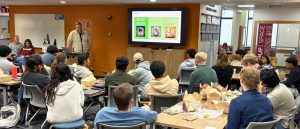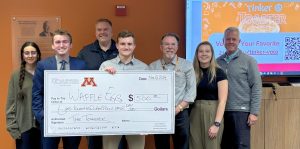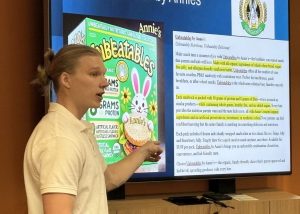 The Tinker @ the Toaster innovation challenge has emerged as a unique platform for University of Minnesota students to harness the power of innovation and unleash their creativity. Sponsored by Google Cloud and General Mills, and the Holmes Center for Entrepreneurship and CFANS, this semester’s Toaster Innovation Hub competition tasked students with using AI to develop innovative consumer concepts.
The Tinker @ the Toaster innovation challenge has emerged as a unique platform for University of Minnesota students to harness the power of innovation and unleash their creativity. Sponsored by Google Cloud and General Mills, and the Holmes Center for Entrepreneurship and CFANS, this semester’s Toaster Innovation Hub competition tasked students with using AI to develop innovative consumer concepts.
At the kickoff event, 53 participants were introduced to the latest advancements in AI and challenged to utilize either generative or traditional AI as an enabler for their product ideas. Over two weeks, 11 finalists created and presented their concepts, ranging from plant-based dog food to caffeinated coffee-flavored chips and shelf-stable ready-to-eat meals. The winning idea, WaffleEgg, a protein breakfast sandwich, took the first prize of $500, showcasing how AI can be leveraged to create a convenient, healthy, and delicious morning meal option.
Through interviews with the event host, UMN’s Jeff Stamp, and guest speakers from Google Cloud, Anne Ehrhart and Juliana Siward, the Tinker Challenge’s unique approach became clear to me. Unlike traditional innovation competitions, this event focuses on the early-stage ideation process rather than an actionable business plan—this focus asks students to explore problems and find creative solutions, encouraging them to at least take that first step through the door.
The 2024 Tinker Challenge Prompt: Harnessing AI for Food and Beverage Innovation

General Mills representative Ryan Horton discuss how the corporation utilizes AI for product innovation.
The Tinker Challenge kickoff event on October 25 saw 53 participants hear from guest speakers from Google Cloud and General Mills, who discussed AI and its applications and trajectory, and explored how students could use AI as an enabler for innovation. Both traditional AI (which relies on comparatively rigid, predefined guidelines) and generative AI (which can create wholly novel ideas by learning from previous patterns) have the potential to create and innovate, but a prevailing theme for success was “human in the loop.”
In my conversation with Juliana Siward, she took note of the “human in the loop” idea and how it set the Tinker Challenge apart from other innovation challenges she knew of. She found merit in how students had to use AI as an enabler, and not a lone problem solver. “Just using AI isn’t gonna get you to win; what’s gonna get you there is ‘human in the loop,’” she told me. “You can’t just ask a question and have AI spit out an answer—you have to be involved and be creative.”
AI can learn from a human, but it can’t be a human; the kickoff event highlighted that users could only fully leverage AI’s potential if they inform it fully and specifically. The participants had to understand their target market and specific consumers before consulting AI to further bolster their ideas and frameworks. In this way, AI was promoted as less of a mechanical problem-solving instrument and more of an interactive teammate with potential and insights humans alone may lack.
Near the end of the kickoff, Jeff, the CFAN professor who served as challenge host, introduced the Consumer Concept Challenge. He encouraged students to break down their innovation processes, beginning with “scanning the opportunity space.” Surveying the market’s opportunities included practices such as assessing market trends, shifts in consumer preferences, and problem identification.
He prompted participants to leverage AI to create a new consumer concept (minimum viable concept, or MVC), for a product for the food and beverage market sector. The students, either individually or in teams, were given two weeks to ideate before presenting their MVCs at the finals on November 8.
At the end of the kickoff, participants buzzed around the room to connect with guest speakers before starting ideation; I myself spoke with Juliana and Anne briefly.
“I haven’t had too much experience with other innovation hubs at other universities; I’m not aware of many resources like this,” shared Juliana. Her excitement was palpable as she scanned the Toaster. “You even have your own venture capital group.”
Juliana proceeded to discuss her excitement for the University in general: “Your community is so special,” she said. “Everyone is engaged, and you also have strong professors. I met some adjunct professors who work for Google, Mayo Clinic, and General Mills; these are professors working for Fortune 500 companies and are still engaged in academia. Even in my master’s program you never had professors guide you like this.”
Anne shared similar excitement for the Tinker Challenge and the UMN community: “I love seeing students ideate—it’s interesting to see how the next generation is thinking forward. Here, I’m able to get into young minds and see how they see things differently, and how they will shape our future.”
Two weeks later, judges John Stavig (Managing Director of the Holmes Center for Entrepreneurship), Morgan Kerfeld (Associate Director for the Holmes Center), and Ryan Horton (Digital & Technology Manager at General Mills) evaluated 11 ideas at the finals on November 8. From Blue PlantPower’s plant-based dog food to GoodGrains’ shelf-stable, ready-to-eat meals, the finalists demonstrated their ability to take advantage of AI to address consumer needs in the food and beverage market. The range of concepts highlighted the students’ multifaceted approaches to problem-solving, with each idea offering a unique solution catered to different consumer preferences and lifestyles. The Tinker @ the Toaster Challenge provided a platform for these student innovators to bring their ideas to life, fostering an environment that encouraged exploration, risk-taking, and solution development.
WaffleEgg, the protein-packed breakfast sandwich, won first place, taking home the prize of $500. Jack Mosh’s innovative concept impressed the judges with its ability to provide a healthy and delicious breakfast option in a convenient, on-the-go format.
Second place and $250 then went to Chef’s Select Meal Helper, a premium alternative to traditional meal kits. Finally, Jelly Bites, the prepackaged dessert without added sugars or artificial flavors, won the audience choice category, earning $100. Each of the winning entries were different, but commonly showed how one can use AI to their advantage to conceptualize novel products, redefining the future of any industry.
Creativity with a Purpose: The Core of the Tinker Challenge
What’s special about this semester’ s Tinker @ the Toaster is that it focused on early-stage ideas, rather than full-fledged business plans. According to Jeff, the Tinker Challenge is about “creativity with a purpose.” Jeff emphasized that the event isn’t just about teaching students, but about allowing them to feel proud of their ideas and solutions. “I enjoy seeing the light in students’ faces when they have something [an idea] and are proud of it,” he told me. “They need to feel proud. We also get a lot of first-gen students, which is exciting.”
The challenge’s unique approach sets it apart from other innovation events that Jeff has judged across the nation. Rather than focusing on the potential for financial gain and actionable business plans, the Tinker Challenge encourages participants to identify problems and creatively solve them, giving the spotlight to early-stage ideation.
As Anne noted, it’s unique because students get to combine AI, a resource used in personal life, and macro-market applications, which go beyond their personal lives. “It allows students to harness a new and emerging technology to bring their learning and problem solving forward,” she said.
The Tinker Challenge’s emphasis on early-stage ideas and creativity with purpose aligns with the event’s broader mission to empower students and help them find their voice. As Jeff advises, it’s about “enduring possibility” and not giving up in the face of doubt. The challenge encourages students to listen to consumers, trust their intuition, and keep pushing forward, even when the path seems uncertain.
Jack Mosh’s Winning WaffleEgg
Jack Mosh, a junior majoring in financial analysis and business management, won the first prize of $500 at Tinker @ the Toaster. His winning concept, WaffleEgg, was a breakfast sandwich that swapped out carb-heavy buns for protein-packed waffles, offering a healthier and tastier alternative to traditional breakfast sandwiches.
“The sandwich is unique because it offers both a health benefit and it’s tasty,” Jack explained. “It’s low-calorie and high-protein, which ensures the best of both worlds. WaffleEgg provides a healthy, tasteful start to the morning in just one minute.”
Jack also shared that he used AI to help with the structure and formatting of his consumer concept. “I knew I had the idea I wanted, but I wasn’t sure how to put it all together,” he said. “I put in my idea, and AI helped me come up with a structure and format that worked out well.” Jack’s approach to using AI allowed him to refine and present his innovative WaffleEgg idea in a compelling, marketable way. It worked well, considering he won first prize.
“Finding the perfect idea and ways to put the idea together took many tries to find the best,” he confessed. “I learned that not all ideas happen immediately, sometimes you keep thinking and thinking, and eventually, it clicks.”
And in developing a perfect idea, Jack added that creativity stems from necessity and passion: “My advice to future participants is for them to design a product they have a passion for. A lot of times I want an early morning breakfast snack that is healthy, but tasty. I found a need, and I made a product that fit that need.”
Final Takeaways from Tinker @ The Toaster
Innovation can be difficult, it shouldn’t discourage anyone from giving it a try. While sitting at the two Tinker Challenge events and in conversation with those involved, it was clear that creativity is boundless. I saw a variety of strong ideas at the finals, and I drew parallels between Jack’s advice and other participants’ ideas: their ideas were as strong as they were because they came from passion. All the products were different, but each one was connected by the participants’ personal interests and desires in the food and beverage sector. Their personal wants and needs were reflected in their ideas, and taking them to Tinker @ the Toaster came from ascertaining that other consumers shared those wants and needs.
When I asked Jeff, Juliana, Anne, and Jack about their advice for students who may want to participate in the Tinker Challenge in the future, they all agreed that ideation and development takes time and patience.
To Jeff, time and patience hinges on market research and listening to others: “Listen to consumers because consumers see value. When people present, you can tell who truly believes it can happen, and who imagines it can happen.”
Juliana’s advice was more inwardly focused. “Don’t second guess yourself. Our first reaction is not always correct, but still trust your intuition, and don’t let doubt take over.” Juliana’s advice spoke more towards the time it takes to trust ourselves—it’s easy to second-guess ourselves, but it’s healthy to accept challenges and try things out. Even if our first reactions and iterations of an idea aren’t correct, they can still lead to valuable insights.
Finally, Anne offered three-pronged advice that encompassed both outward-facing considerations and personal development. “First, act out of curiosity. When you look for problems, you are more apt to look for solutions. Dig into your curiosity and ask why. Second, have relentless ownership of your ability and take initiative to take on something you’re passionate about. Finally, be someone who makes someone better. Push them to be their best, and that can make you your best.”
While I didn’t participate in Tinker @ the Toaster, I still learned lessons in creativity, conception, and action. Creativity, conception, and action are transferable ideas for any field of study or work, whether you’re literally designing a consumer product or not. In any field, we work to design ideas to help someone with something. At Tinker @ the Toaster, I saw firsthand that progress and innovation isn’t always linear; we can’t know what best helps someone with something unless we try, refine, and take our time.






